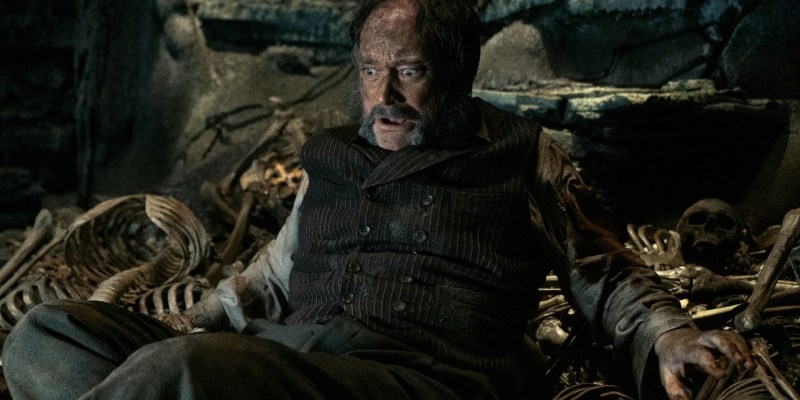This article contains spoilers for Guillermo Del Toro’s Cabinet of Curiosities episode 2, “Graveyard Rats,” as well as Mouse Hunt, a kids’ movie from 1997.
“Graveyard Rats,” the second anthology story in Guillermo Del Toro’s Cabinet of Curiosities, is directed by Vincenzo Natali and stars David Hewlett as Masson, a graverobber in 20th century Salem, Massachusetts. Masson puts on an elaborate, educated air, and his manner implies he feels superior to most of the people he encounters in this episode. But his trade means he is constantly plunging his fingers in and around decaying bodies and sparring with the growing rat population for the best corpses in town. He is desperate in the face of building debts, and as his treasure hunt turns into an underground fight for survival when he goes too far, his prayers to God for redemption are not heard.
This episode is a great introduction to Del Toro’s anthology series with some solid scares and a strong leading performance by Hewlett. But on top of all this, seeing an arrogant huckster who gets swarmed and outsmarted by rats in one of the episodes triggered a deep memory from my childhood VHS days: I remembered Nathan Lane in a mustache trying to shoot down an objectively cute little house mouse and dismantling his inherited mansion in the process.
I am talking about the 1997 family comedy film Mouse Hunt, directed by The Ring director Gore Verbinski in his feature debut and starring Lee Evans and Nathan Lane. It was my jam back in the day, the 42% Rotten Tomatoes score and Roger Ebert’s two-star rating be damned. The chemistry between Evans and Lane as the Smuntz brothers, wild slapstick gags from the very first scene, and a 10/10 Christopher Walken cameo make this film still a fun watch today, though some friends and alcoholic beverages undeniably improve the experience.
Initially, rodent subject matter may seem like the only similarity between “Graveyard Rats” and Mouse Trap. “Graveyard Rats” employs some gnarly gore and special effects puppetry for underground monsters, including some terrifying swarms and a very cool giant rat monster puppet. Mouse Hunt alternatively sticks with a PG rating and just escalates the war between man and mouse into a cartoony equivalent of a Tom and Jerry episode in live action, though it does have one gross-out scene of its own.
Yet these narratives have similar enough plot framing and characterization. The protagonists are both benefiting from death in their own ways. The Smuntz brothers open Mouse Hunt by inheriting a string factory and fixer-upper mansion from their tycoon father, before promptly screwing up his funeral by literally dropping his stiff down a manhole. Masson tells off some young intruders in the cemetery in “Graveyard Rats,” but just until they’re far enough away for him to loot it himself. He then gets set on a path to try to rob a deceased noble’s priceless saber, but he is forced to crawl underground when the titular rats drag the corpse away first.
Some of Mouse Hunt’s moments, if edited around, would be effective in a horror movie. In fact, the odd parallels between these two seemingly disparate works could be seen as an unlikely case study for the similarities between the comedy and horror genres. From the first frame, you know Mouse Hunt is going to be a cartoony romp, but it still makes great use of suspense when we’re with the mouse’s perspective seeing it avoid attacks from the comparatively massive brothers. A great example is this nail gun scene that has an effective jumpscare for a kids’ movie. The mouse could be a horror movie villain in his own right though, given how it treats Christopher Walken and manages to cram him in a trunk in the attic.
In the end though, beyond their intended audience and genre, it’s how Mouse Hunt and “Graveyard Rats” approach cynicism that really separates the two. Mouse Hunt doesn’t pull punches on its leads for much of the movie, but it ends in a more family-friendly manner when the mouse helps them retool the string factory into a string cheese… or cheese string factory. Lars Smuntz (Evans) also acts as a sentimental foil to Ernie (Lane). Lars has his own vindictive and psychotic moments when pushed to the brink by the mouse, but it still brings a more tender core to the movie. Ernie’s cold, mouse-murdering heart is eventually melted in the spirit of the cheese string grind.
Masson is not afforded the same redemption in “Graveyard Rats,” nor does he really deserve it. Hewlett’s acting walks a fine line where he isn’t so despicable that viewers want to watch him outright die, but when he begins praying at his most desperate moments in the snaking tunnels under the graveyard, you don’t believe he’d really change his ways as he promises. Masson is ultimately punished for his greed, having an opportunity to take the saber he came for but then also trading up for a sinister amulet that practically has an “I’m Haunted” sign on it and reviving the torso of a zombie-like creature who joins the giant underground rat in chasing him.
The tension is drawn out as far as possible, as he manages to even claw his way back up to a coffin. But Masson asphyxiates and becomes an avatar of whatever dark spirit he spurned, rats seething within his corpse and the amulet around his neck in the final shot.
Ultimately, despite how wide the gulf may be between them, putting Mouse Hunt and “Graveyard Rats” together can make you understand why Verbinksi would later go on to direct such an effective horror film as The Ring. As we understand even better now with filmmakers like Jordan Peele and Barbarian’s Zach Cregger, audiences need to watch out for the comedians who decide to use their powers for evil and horror.
